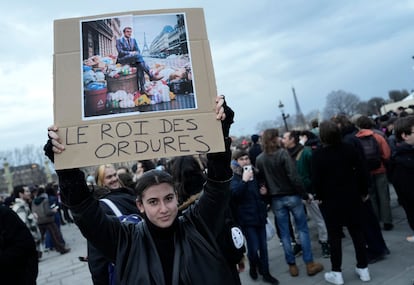French pension protests mostly calm, uncollected trash grows
Police banned further gatherings on the Place de la Concorde, where protesters tossed an effigy of Macron into a bonfire as a crowd cheered Friday night

A smattering of protests against President Emmanuel Macron’s plan to raise France’s retirement age from 62 to 64 took place Saturday, as uncollected garbage continued to reek in the streets of Paris and beyond amid a strike by sanitation workers.
Largely non-violent protests were held in various French cities, including Nantes and Marseille, where protesters got past police to occupy the main train station for around 15 minutes. In the eastern city of Besancon, hundreds of demonstrators lit a brazier and burned voter cards.
In Paris, an eerie calm returned to the French capital after the two consecutive nights of unrest. Police banned further gatherings on the Place de la Concorde, where protesters tossed an effigy of Macron into a bonfire as a crowd cheered Friday night.
Police also prohibited gatherings on the Champs-Elysées avenue, where some protesters set fires earlier in the week after officers charged demonstrators to disperse them.
Further protests were called for Saturday evening in other parts of the French capital, but they were expected to be smaller than the previous ones.
Protesters are trying to pressure lawmakers to bring down Macron’s government and doom the unpopular retirement age increase he’s trying to impose without a vote in the National Assembly.
After Prime Minister Elisabeth Borne invoked a special constitutional power to skirt a vote in the chaotic lower chamber, lawmakers on the right and left filed no-confidence motions against her Cabinet on Friday. The motions are expected to be voted on Monday.
Some Paris residents who were out buying their weekend baguettes blamed Macron’s administration for the fumes wafting from the trash piled up near a bakery in the city’s 12th district.
“The government should change its position and listen to the people because what is happening is extremely serious. And we are seeing a radicalization,” Isabelle Vergriette, 64, a psychologist, said. “The government is largely responsible for this.”
The district’s mayor, Emmanuelle Pierre-Marie, was out and about from the crack of dawn voicing concern in her neighborhood about the consequences of the uncollected garbage, which has become a visual and olfactory symbol of the actions to defeat the president’s pension reform plan.
“Food waste is our priority because it is what brings pests to the surface,” Pierre-Marie said. “We are extremely sensitive to the situation. As soon as we have a dumpster truck available, we give priority to the places most concerned, like food markets.”
More labor strikes are planned for Monday in numerous sectors, from transportation to energy. The Civil Aviation authority asked to have 30% of flights canceled at Orly, Paris’ second airport, and 20% in Marseille.
Trade union confederation CGT warned that at least two oil refineries might be shut down starting Monday. Industry Minister Roland Lescure said the government could requisition personnel — order workers back to their posts — to avoid fuel shortages.
Macron has argued that requiring people in France to work two more years is needed to invigorate the country’s economy and to prevent its pension system from falling into a deficit as the population ages.
Laurent Berger, head of the moderate CFDT union, said the retirement reform “must be withdrawn.”
“We condemn violence. ... But look at the anger. It’s very strong, even among our ranks,” he said on RMC radio.
Sign up for our weekly newsletter to get more English-language news coverage from EL PAÍS USA Edition
Tu suscripción se está usando en otro dispositivo
¿Quieres añadir otro usuario a tu suscripción?
Si continúas leyendo en este dispositivo, no se podrá leer en el otro.
FlechaTu suscripción se está usando en otro dispositivo y solo puedes acceder a EL PAÍS desde un dispositivo a la vez.
Si quieres compartir tu cuenta, cambia tu suscripción a la modalidad Premium, así podrás añadir otro usuario. Cada uno accederá con su propia cuenta de email, lo que os permitirá personalizar vuestra experiencia en EL PAÍS.
¿Tienes una suscripción de empresa? Accede aquí para contratar más cuentas.
En el caso de no saber quién está usando tu cuenta, te recomendamos cambiar tu contraseña aquí.
Si decides continuar compartiendo tu cuenta, este mensaje se mostrará en tu dispositivo y en el de la otra persona que está usando tu cuenta de forma indefinida, afectando a tu experiencia de lectura. Puedes consultar aquí los términos y condiciones de la suscripción digital.








































